

A Case for Pseudonyms. Pseu·do·nym [sood-n-im] –noun a fictitious name used by an author to conceal his or her identity; pen name.
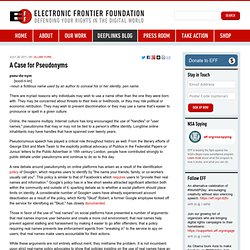
There are myriad reasons why individuals may wish to use a name other than the one they were born with. They may be concerned about threats to their lives or livelihoods, or they may risk political or economic retribution. They may wish to prevent discrimination or they may use a name that’s easier to pronounce or spell in a given culture. Online, the reasons multiply. The freedom to be who you want to be… Posted by Alma Whitten, Director of Privacy, Product and Engineering Peter Steiner’s iconic “on the Internet, nobody knows you’re a dog” cartoon may have been drawn in jest--but his point was deadly serious, as recent events in the Middle East and North Africa have shown.
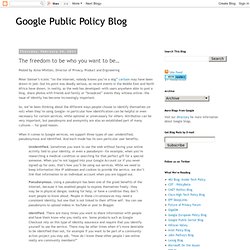
In reality, as the web has developed--with users anywhere able to post a blog, share photos with friends and family or “broadcast” events they witness online--the issue of identity has become increasingly important. So, we’ve been thinking about the different ways people choose to identify themselves (or not) when they’re using Google--in particular how identification can be helpful or even necessary for certain services, while optional or unnecessary for others.
Attribution can be very important, but pseudonyms and anonymity are also an established part of many cultures -- for good reason. When it comes to Google services, we support three types of use: unidentified, pseudonymous and identified. Unidentified. Who is harmed by a "Real Names" policy? This page lists groups of people who are disadvantaged by any policy which bans Pseudonymity and requires so-called "Real names" (more properly, legal names).
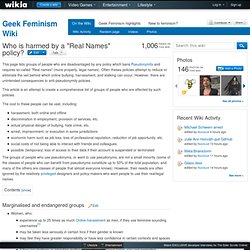
Often theses policies attempt to reduce or eliminate the veil behind which online bullying, harrassment, and stalking can occur. However, there are unintended consequences to anti-pseudonymity policies. This article is an attempt to create a comprehensive list of groups of people who are affected by such policies. The cost to these people can be vast, including: harassment, both online and offline discrimination in employment, provision of services, etc.
“Real Names” Policies Are an Abuse of Power. Everyone’s abuzz with the “nymwars,” mostly in response to Google Plus’ decision to enforce its “real names” policy.
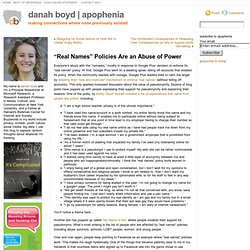
At first, Google Plus went on a deleting spree, killing off accounts that violated its policy. When the community reacted with outrage, Google Plus leaders tried to calm the anger by detailing their “new and improved” mechanism to enforce “real names” (without killing off accounts). This only sparked increased discussion about the value of pseudonymity. Dozens of blog posts have popped up with people expressing their support for pseudonymity and explaining their reasons. One of the posts, by Kirrily “Skud” Robert included a list of explanations that came from people she polled, including: “I am a high school teacher, privacy is of the utmost importance.” Anonymity has value, in comments and elsewhere. Christopher "moot" Poole: The case for anonymity online. Randi Zuckerberg Runs in the Wrong Direction on Pseudonymity Online. The Nymwars rage on.
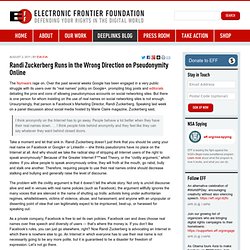
Over the past several weeks Google has been engaged in a very public struggle with its users over its “real names” policy on Google+, prompting blog posts and editorials debating the pros and cons of allowing pseudonymous accounts on social networking sites. But there is one person for whom insisting on the use of real names on social networking sites is not enough. Unsurprisingly, that person is Facebook’s Marketing Director, Randi Zuckerberg.
Speaking last week on a panel discussion about social media hosted by Marie Claire magazine, Zuckerberg said, I think anonymity on the Internet has to go away. Take a moment and let that sink in. The problem with the civility argument is that it doesn’t tell the whole story. As a private company, Facebook is free to set its own policies. Internet Evolution: The War on Web Anonymity. The Avenue de l'Opéra in Paris is a respectable address, surrounded by banks, boutiques and cafés.
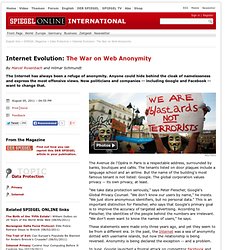
The tenants listed on door plaques include a language school and an airline. But the name of the building's most famous tenant is not listed: Google. The global corporation values privacy -- its own privacy, at least. "We take data protection seriously," says Peter Fleischer, Google's Global Privacy Counsel. "We don't know our users by name," he insists.
These statements were made only three years ago, and yet they seem to be from a different era. Why Facebook and Google's Concept of 'Real Names' Is Revolutionary - Alexis Madrigal. The primary version of identity online is a radical departure from what we expect in real life Should you have to use your real name online?

It's an issue that's long simmered among social media critics and supporters alike. On one end of the spectrum, there's 4chan, where everything is anonymous. On the other, there are Facebook and Google Plus. Both have drawn fire from for categorically preventing people from using pseudonyms. “For Those Who Don’t Want To Believe” Surprisingly Good Evidence That Real Name Policies Fail To Improve Comments. Online anonymity.